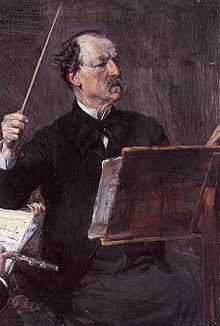Emanuele Muzio
From Wikipedia, the free encyclopedia

Emanuele Muzio, portrait by Giovanni Boldini
Donnino Emanuele Muzio (24 August 1821 in Zibello – 27 November 1890 in Paris) was an Italian composer, conductor and vocal teacher. He was a lifelong friend and the only student of Giuseppe Verdi.[1]
Biography
Muzio studied with Ferdinando Provesi, from 1844 with Giuseppe Verdi, and also was a piano student of Verdi's first wife, Margherita Barezzi.[2]
In 1852, Muzio was conductor of the Italian Opera in Brussels. He later conducted in London and at the Academy of Music in New York City. In 1875, he settled in Paris as a vocal teacher. His students include Carlotta Patti and Clara Louise Kellogg.[2]
Selected works
- Opera
- Giovanna la pazza, Opera in 3 acts (1851); libretto by Luigi Silva; premiere at Teatro Italiano in Brussels
- Claudia, Lyric Melodrama in 3 acts (1853); libretto by Giulio Carcano; premiere at Teatro Re in Milan
- Le due regine, Tragic Melodrama in 3 acts (1856); libretto by Giovanni Peruzzini; premiere at Teatro della Cannobiana in Milan
- La sorrentina, Lyric Drama in 4 acts (1857); premiere at Teatro Comunale in Bologna
- Chamber music
- Mazurka di concerto for horn and piano (1849)
- Andante e Rondoletto for viola and piano (1858)
- Piano
- 3 Studi sopra una cavatina dell'opera "La battaglia di Legnano" di Verdi (1849)
- Piccolomini Waltz (1858)
- Rebecca Waltzes (1860)
- The Great Uprising-Galop for piano 4-hands (1862)
- Emma Polka (1864)
- Grand March and Soldiers' Chorus, Transcription from Charles Gounod's Faust (1864)
- Vocal
- Sempre più t'amo for voice and piano (1863); words by A. Bertola
- La nanna, Cradle Song for voice and piano (1864)
- La vedova for voice and piano (1864); words by Felice Romani
- Le sorelle, Valse brillante for voice and piano (1864)
- L'usignuolo (The Nightingale) for voice and piano (1864)
- Sospiro (The Sigh) for voice and piano (1864); words by Silvio Pellico
- La Madonna del pescatore, Canzone napolitana for voice and piano (1866?)
- All'aura for voice and piano (1869)
- Barcarola veneziana for 2 voices and piano (1869)
- Brindisi for 2 voices and piano (1869)
- Duettino for 2 voices and piano (1869)
- L'invito alla danza, Tarantella for voice and piano (1869)
- L'amore, La Polka for voice and piano (1869)
- Stornello toscano for voice and piano (1869)
References
- ↑ Van, Gilles de (1998). Verdi's Theater: Creating Drama through Music. Chicago: University of Chicago Press. p. 369. ISBN 0-226-14369-4.
- ↑ 2.0 2.1 Theodore Baker and Alfred Remy, ed. (1919). "Muzio, Emanuele". Baker's Biographical Dictionary of Musicians (3rd ed.). p. 639.
Bibliography
- L'allievo di Verdi: Emanuele Muzio by Gaspare Nello Vetro (Parma: Zara, 1993) (Italian)
External links
This article is issued from Wikipedia. The text is available under the Creative Commons Attribution/Share Alike; additional terms may apply for the media files.